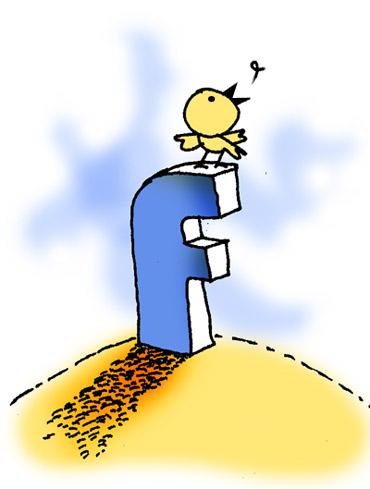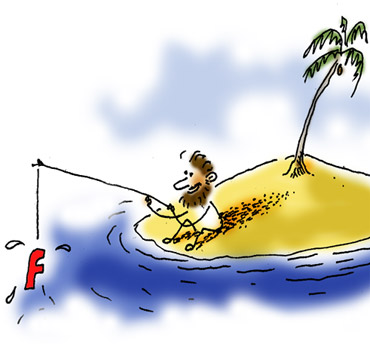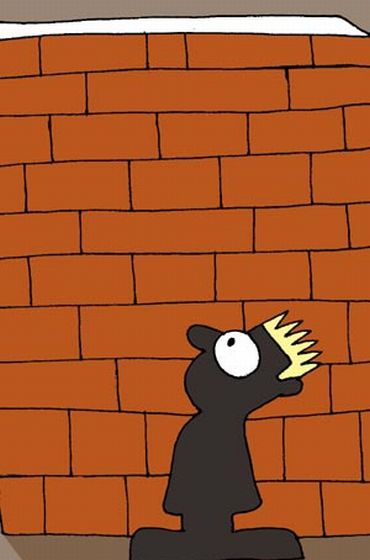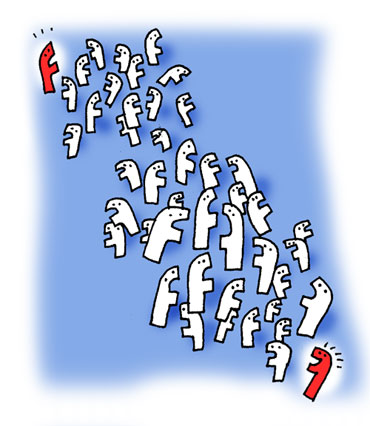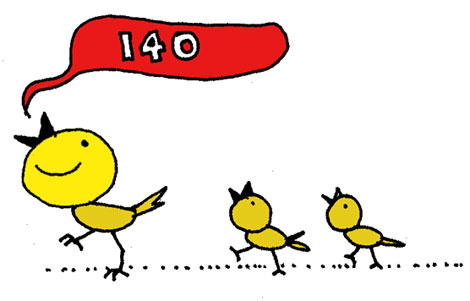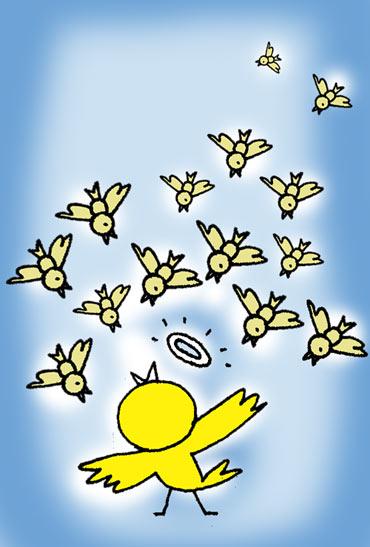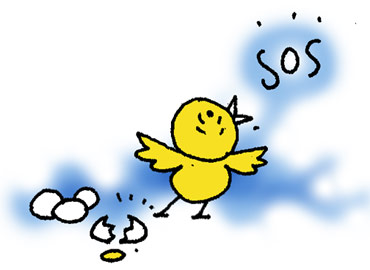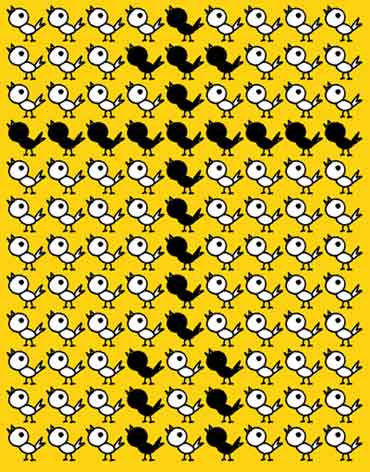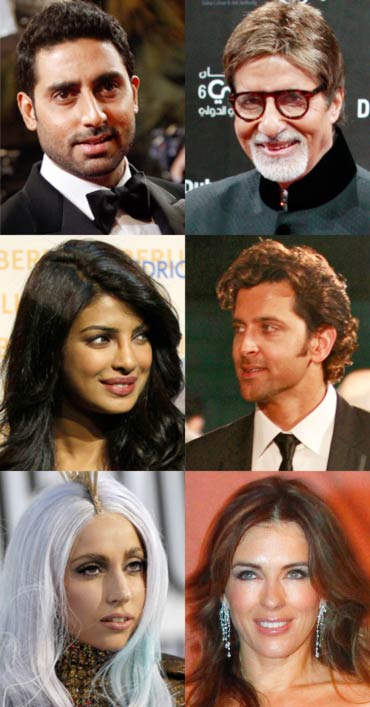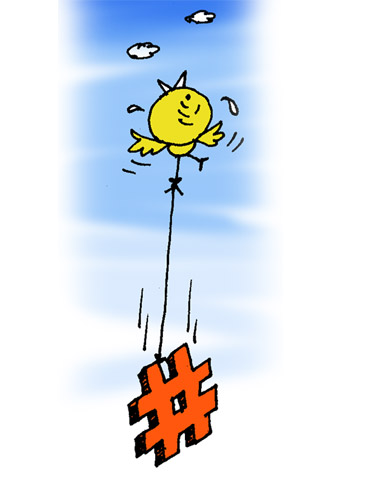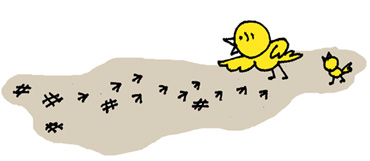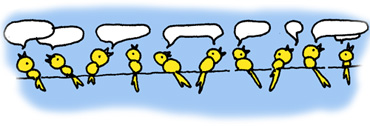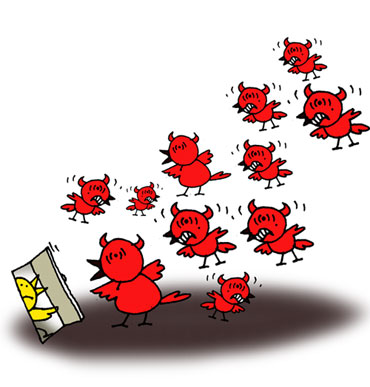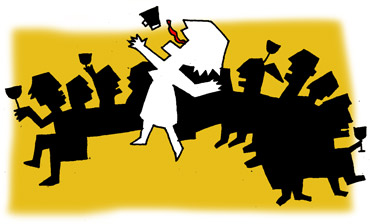 | « Back to article | Print this article |
De-friending, RTing, Hashtag: Hep online lingo!
We give you a lowdown on the hottest phrases that are fast becoming the lingua franca of Young India.
Ever felt that sinking feeling of having an absolute communication breakdown with your child or that young colleague who's hopped out of university onto the desk right next to you?
Worse still, imagine connecting with these people on Facebook (though it seems less likely that your child would add you as a 'friend') or following their Twitter feed and being completely lost about what the hell they're talking about.
We took you through some of the many texting abbreviations recently.
So here's a crash course on what you should know if you're on Twitter and/or Facebook
Illustration: Dominic Xavier
Facebook is now a verb
First off, unless you were stranded on a remote island for the last couple of years, you'd know Facebook, like Google, has become a verb, which means just like you 'google' something you can also 'facebook' someone.
Imagine yourself wanting to connect with the person you met at a party the other night. You facebook her, add her as a friend and if you were anywhere close to being interesting to her, you can expect her to accept your 'friend request'.
A piece of advice though -- when you add someone, don't say 'I want to make friendship with you'. Despite being grammatically incorrect, it was cool way back in the '90s on ICQ (remember that?).
Illustration: Dominic Xavier
Facebook Whale
Sure, some of us get a great high when looking at our profile pages if we see a stupendously huge number of friends.
But when your friends' list begins to look like a big fat Indian wedding, where you don't know 97.3 per cent of the people, it means you are a Facebook Whale.
Basically, a person who simply keeps adding 'friends' and someone who needs a life.
Illustration: Uttam Ghosh
Status plagiarism
Originality, they say, is when you remember something but simply cannot remember who said it.
By that definition status plagiarism comes close to originality.
Only, on the web someone will know the source or your originality, which can be terribly embarrassing. (Unless of course you're Anu Malik or Bappi Lahiri. In which case you'd probably sue the person in return.)
So when you come across something smartass, make sure you credit the person who said it. Besides being the right thing to do, you'd also save the embarrassment of being called a plagiarist in full view of your 3,561 friends and the PYT you were trying to impress.
Illustration: Uttam Ghosh
Wall sniper
S/he is someone who simply cannot see the good side of anything. And we mean absolutely anything. The moment you post something on your wall, you can expect a negative reply from this person.
Say something about the weather and s/he'll say something to the effect of: 'Yeah it's such a b**ch'.
Post something about the weekend and you can expect: 'Mine was soooo lame, isn't funny'.
Why anyone would want to have this person on their Facebook list -- or any list, for that matter -- is beyond us!
Illustration: Uttam Ghosh
De-friend, de-friend, de-friend!
That is exactly what a wall sniper deserves. De-friending is when you decide you've had enough of this person online and simply block him/her from your list.
The beauty of this whole thing is that the de-friended person will not receive any notification that you've done it at all. But they'll find out soon enough when they see you're not on their friend list anymore and can't see your updates.
Unless the person is dumb chances are s/he won't send you a friend request again. Then again, don't be surprised if you do get one. In which case you can well ignore it.
Illustration: Uttam Ghosh
FBIM
That's the short for Facebook Instant Message. When you want to send someone a private message you use FBIM.
Although it hasn't as yet become a verb like DM, we suppose it won't be long before you hear people asking you to 'FBIM' them.
Illustration: Dominic Xavier
Personalise Twitter with DM
Which is Direct Message. It is something you use when you want to communicate with someone privately on Twitter. Unlike FBIM, DM is restricted to 140 characters and cannot be sent to someone who doesn't follow you.
Illustration: Dominic Xavier
Followers
Are Tweeple who follow your twitter feeds, RT them, reply to them and if it tickles your fancy, you can follow them back!
Illustration: Dominic Xavier
Pass it along with RT
When you want to share a tweet with your followers, you re-tweet or RT. This could be anything -- something silly someone said or a distress call for blood donation.
Illustration: Dominic Xavier
Tweeple
In case you were wondering about the 'tweeple' mentioned back there, they are, quite simply put, people on Twitter. These are the minions -- people like you and me -- non-celebrities who are on the microblogging site because we want to be there.
Illustration: Dominic Xavier
Twiterrati
Twitter, if you've noticed, has a particularly large lot of celebrities furiously tweeting about their work, families, babies, pets, pet-groomers, gardeners -- you get the picture.
These usually include folks from the movie business, sports stars and the like. More often than not, they use this as a platform to interact with -- you guessed it -- tweeple.
The handy hashtag
Till not very long ago, the hashtag (#) occupied an unflattering spot on your mobile phone that you used only when you wanted to check your balance talktime.
Thanks to Twitter though, the hashtag has risen drastically in the hierarchy of symbols.
The hashtag followed by any word without with a space starts a 'trend' -- basically a topic around which people tweet.
For instance #ihatemondays, #damnitstrue, #goldenglobes or #oscars.
Illustraion: Dominic Xavier
#FF or #FollowFriday
Now, here's how to suggest that your followers follow some of the people you follow.
This is a great way to get introduced to new tweeple and as you'd have figured, it usually will cram your timeline on a Friday.
Timeline
Is the screen that shows updates from all the people you follow!
Illustration: Dominic Xavier
Trolls
Trolls are basically spammers -- they will follow you without so much bothering to know who you are or what you're tweeting about. Most of these are automated engines that will pick your profile based on what you tweet and just follow you.
Illustration: Dominic Xavier
Tweetup
Tweetup is when you physically meet up with the people you've been talking to on Twitter.
Tweetup is different from a date. Meet-ups include a group larger than two and on most occasions don't end up in someone's bedroom.
So now that we've given you a lowdown on the most essential phrases in social networking, why don't you tell us the ones we might've missed!
Post them on the discussion board below!
